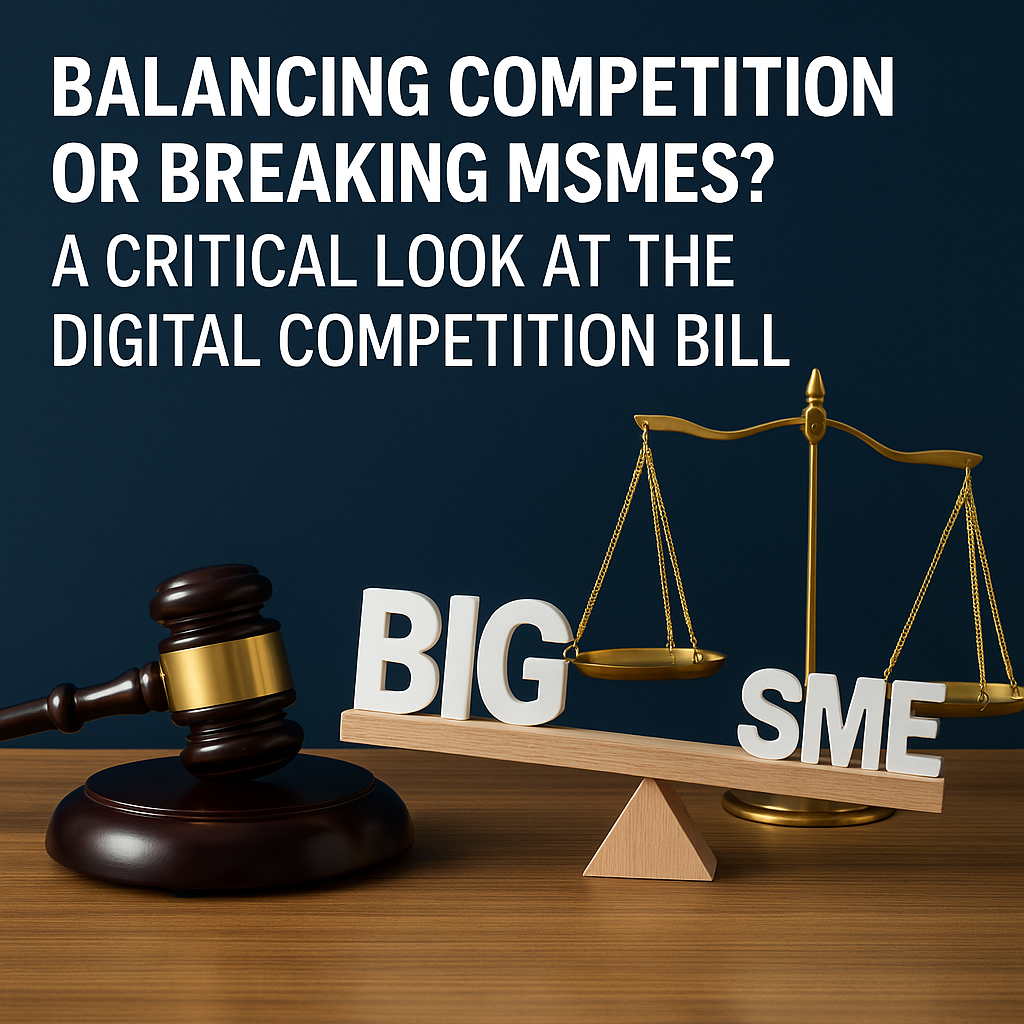|
Powered by AltAlpha AI
|
The authors Pragya Jha & K. Mridula are students at Gujarat National Law University, Gandhinagar
Introduction
The rise of digital marketplaces has lead to monopolization by leading technology companies and their anti-competitive practices in digital space. The DCB 2024 as introduced with the intention of solving this issue by introducing new regulatory frameworks with the objective of promoting balanced competition and consumer protection in the digital space. Yet, the challenge of regulating digital markets and ensuring innovation while safeguarding the interests of Micro, Small, and Medium Enterprises (MSMEs) has become increasingly challenging. As MSMEs play a crucial role in the economy, particularly in countries like India, their reliance on digital platforms for low-cost advertisement, consumer engagement, and business growth cannot be overlooked. Yet, regulation aimed at curbing the dominance of leading technology companies can end up stifling the potential for MSMEs’ growth. Although the bill is introduced in good faith, it can dislocate critical mechanisms on which many small businesses survive and remain competitive.
Changes in Targeted Advertising That Will Cost MSMEs Their Competitive Edge
Targeted advertising is a popular and effective way to market online, where companies create ads tailored to your interests and preferences. Many businesses take a consumer-focused approach by using behavioural targeting. This means they look at data like the links you click, the pages you visit, and your previous purchases to better understand what you like. This method not only helps companies reach you in a more personalized way but also saves them money and boosts sales by connecting with you effectively. It’s a win-win for both consumers and businesses.
MSMEs in India and especially the micro enterprises that account for approximately 97.7% of the total the MSMEs as of March, 2024 heavily rely on targeted advertising for maximizing their efficiency gains. These micro enterprises obtain consumer personal usage data mostly available at big techs platforms or SSDEs from large digital platforms, also referred to in the Digital Competition Bill as Systemically Significant Digital Enterprises (SSDEs). SSDEs are large-scale digital platforms that hold considerable market influence due to their size, user base, and critical role in the digital ecosystem. For instance, online behavior is most commonly detected through web browsing activity and Google searches, which help businesses tailor ads effectively to consumer interests.
Small businesses use a Pay-Per-Click (PPC) model based on insights about consumer preferences collected by big tech companies. This model lets them compete for ad placement in the sponsored links of search engines when someone searches for products or services related to what they offer. Digital ads are a powerful tool for the MSMEs in India, especially those operating on tight budgets. By investing just Rs 20,000 in a year, MSMEs can reach their target markets and earn good returns.
The DCB derails this win-win situation for MSMEs by imposing limitations on the use of personal data by the SSDEs. A straightforward reading of the Section 12(2) of the Draft Bill conveys its limitation on the use of data by the big techs and how it would impact the targeted advertising. The draft Bill imposes unreasonable limitations on SSDEs that could stifle innovation and growth. While it attempts to stifle self-preferencing and promote competition, the restrictions on favoring their own products and limiting third-party applications could suffocate the very ecosystem that promotes diversified businesses. Further, the restrictions on user settings and anti-steering rules could interrupt crucial communication channels between service providers and their customers. These measures may negatively impact MSMEs relying on the services of big tech for low-cost digital advertising. Rather than promoting fairness, this Bill can create an environment that handicaps their efforts to perform better in a competitive digital economy. We are dedicated to finding a balance between fair practices and the requirement for growth and innovation and view this Bill as prejudicial to various businesses.
The DCB fundamentally fails by grouping advertisers, publishers, and third-party ad solution providers under the vague term “advertising services” ignoring their distinct roles. Its stringent user consent requirements for data usage hinder targeted advertising effectiveness. As millions of businesses rely on user data for sales, the DCB’s regulations threaten to compromise the entire advertising ecosystem. When this synergy is disrupted, MSMEs will face significant losses in efficiency essential for growth. The breakdown of targeted advertising and limited data access will undermine their cost-effective consumer outreach and customer acquisition strategies. Consequently, they will incur higher costs to maintain sales channels and attract customers, often resulting in more spending on less targeted advertisements.
Tying and Bundling Restrictions and Their Game-Changing Impact on MSMEs
Single Sign on Services
A user can access numerous applications with just one set of login credentials (such as a username and password) using a service called “Single Sign-On” (SSO). When a user switches applications within the same session, the service removes any additional questions and authenticates them for all the applications to which they have been granted access. The digital competition bill aims to regulate this service. It might restrict this service leading to unbundling – creation of standalone apps. This will create difficulties for both consumers and service providers due to increased user authentication and costs. The current smooth functioning will be affected. A survey conducted by CIRC shows that 74% of respondents would feel burdensome if single sign-on feature is removed. A report submitted by Esya Centre has observed that MSMEs can use Single Sign On Service to their advantage by using the vast user bases of digital platforms as a source of new clients. Restricting these services, it was stated, can become a make-or-break element for many MSMEs, since they are at a nascent stage.
Tying and Bundling Restrictions
“Bundling and Tying” describes two types of provider practices: bundling, which involves putting several items or services into a single bundle, and tying, which involves making the purchase of one product or service contingent upon the purchase of another. This implies that there will be limitations on the number of interconnected services that can be offered within a single application. It follows that this unbundling can potentially affect the ease of use and seamless user experience that consumers currently enjoy. Within this particular scenario, it is expected that the deployment of DCB would result in the division of diverse services into independent standalone applications.
Studies have also shown that restrictions on tying and bundling and data usage would negatively impact MSMEs that have come to rely significantly on big tech to reduce operational costs and enhance customer outreach.
According to a recent survey, companies that are more active on digital platforms and have made investments in digital advertising typically service a larger geographic area and have greater export rates than their less active competitors. Additionally, these platforms infuse MSME transactions with a crucial component of trust. Regulations that forbid tying and bundling, which are essential to these platforms, could theoretically promote competition but unintentionally erode this trust by making resolution procedures more difficult than they were before platform services streamlined them. Smaller businesses that disproportionately depend on digital advertising and platform services for their market reach and discovery could be most negatively impacted by this regulatory approach, which could seriously undermine the trust element that platforms have established. They claim that they will not adopt a one-size-fits-all approach, but we must acknowledge that this could hurt startups and MSMEs because small businesses are disproportionately affected by policy uncertainties because they are less prepared to anticipate or manage the effects of such changes, making them more vulnerable in an already difficult marketplace.
Restrictions on “tying and bundling” under a Digital Competition Bill can seriously hurt MSMEs by denying them access to crucial digital services offered by big tech platforms. This could impede their ability to reach customers, expand their market, and grow their business overall, particularly if they rely heavily on these platforms for online visibility and customer engagement. In other words, it would be more difficult for them to compete with larger companies that may have more options for reaching customers without using bundled services.
Suggestions, Recommendations and Conclusion
To reduce the negative effect of the Digital Competition Bill on micro, small, and medium-sized enterprises (MSMEs), we can do some important things. First, we must establish reasonable regulations of data use. These regulations must enable MSMEs to use targeted advertising while protecting consumers’ privacy. Granting MSMEs access to anonymous and aggregated data will allow them to lower their marketing cost without being unfair. We must also think about special regulations or exceptions for MSMEs alone, giving them more relaxed guidelines on data use and advertising. A tiered regulatory system, where smaller businesses have fewer regulations than larger businesses, will allow us to establish a fair platform for everyone.
Second, we must enable various forms of advertising. By establishing low-cost advertising platforms that serve the needs of small enterprises, we can enable them to advertise to themselves effectively without using massive amounts of data. Also, we should keep Single Sign-On (SSO) services functional. Rather than applying strict policies, we should be cautious. This will allow small and medium enterprises to have simpler user logins while also addressing competition issues and maintaining data privacy intact.
We need to provide financial assistance to MSMEs. The assistance in the form of grants, soft loans, or incentives to adopt digital tools will encourage them to adopt the new rules. These actions will minimize the effect of increased compliance costs and will enable MSMEs to compete in the new digital world.





